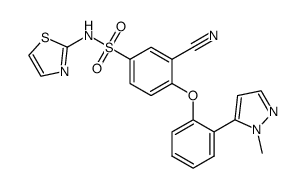PF-04856264
Modify Date: 2025-10-09 20:28:08

PF-04856264 structure
|
Common Name | PF-04856264 | ||
|---|---|---|---|---|
| CAS Number | 1235397-05-3 | Molecular Weight | 437.49500 | |
| Density | N/A | Boiling Point | N/A | |
| Molecular Formula | C20H15N5O3S2 | Melting Point | N/A | |
| MSDS | Chinese USA | Flash Point | N/A | |
| Symbol |

GHS06 |
Signal Word | Danger | |
Use of PF-04856264PF-04856264 is a potent and selective Nav1.7 inhibitor, with IC50s of 28, 131, 19, and 42 nM for human, mouse, cynomolgus monkey and dog Nav1.7, respectively. PF-04856264 has low potency against the rat Nav1.7 channel. PF-04856264 shows analgesic effect[1][2]. |
| Name | 3-cyano-4-(2-(1-methyl-1H-pyrazol-5-yl)phenoxy)-N-(thiazol-2-yl)benzenesulfonamide |
|---|---|
| Synonym | More Synonyms |
| Description | PF-04856264 is a potent and selective Nav1.7 inhibitor, with IC50s of 28, 131, 19, and 42 nM for human, mouse, cynomolgus monkey and dog Nav1.7, respectively. PF-04856264 has low potency against the rat Nav1.7 channel. PF-04856264 shows analgesic effect[1][2]. |
|---|---|
| Related Catalog | |
| Target |
IC50: 28 (human Nav1.7), 131 nM (mouse Nav1.7), 19 nM (cynomolgus monkey Nav1.7), 42 nM (dog Nav1.7)[1] |
| In Vivo | PF-04856264 (3-30 mg/kg; i.p.) reverses OD1-induced pain behaviors[2]. Animal Model: 6-8 weeks adult male C57BL/6J mice (OD1-induced spontaneous pain model)[2] Dosage: 3, 30 mg/kg Administration: I.p. Result: Significantly reduced spontaneous pain behaviors in mice. |
| References |
| Molecular Formula | C20H15N5O3S2 |
|---|---|
| Molecular Weight | 437.49500 |
| Exact Mass | 437.06200 |
| PSA | 146.52000 |
| LogP | 5.16218 |
| InChIKey | MKSKJVIBSRUWSZ-UHFFFAOYSA-N |
| SMILES | Cn1nccc1-c1ccccc1Oc1ccc(S(=O)(=O)Nc2nccs2)cc1C#N |
| Storage condition | 2-8°C |
| Symbol |

GHS06 |
|---|---|
| Signal Word | Danger |
| Hazard Statements | H301 |
| Precautionary Statements | P301 + P310 |
| Hazard Codes | T |
| RIDADR | UN 2811 6.1 / PGIII |
| MFCD28124397 |